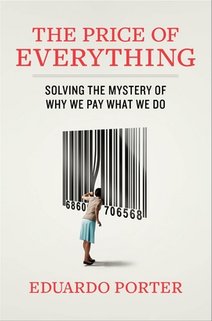
15 Jan 2011 04:08:02
Porter explores the factors we weigh, consciously and unconsciously, in making decisions about things we don't traditionally think of as having prices. And he shows that in every imaginable context our choices are influenced by circumstances and our available alternatives — more than by finance and logic.
Such thinking helps explain numerous apparent paradoxes that Porter highlights, including the fact that people seem more willing to give blood for free than if they are paid $25, and more willing to travel across town to save $20 on a $100 sweater than $20 on a $1,000 computer. Time is worth more or less money depending on who is spending it, just as one person's trash is another person's treasure. So there's a whole lot more than supply and demand going on.
That is, people are obligated, whether by physical circumstances or community and family roles or other situational factors, to consider where they are, their personal history, social norms and fairness in making any economic choice. Institutions and governments likewise: Porter even casts the Protestant Reformation in terms of prices and benefits. After centuries of charging wealthy people ever-increasing fees for indulgences and pardons, the Catholic Church finally hit a ceiling when reformers opened alternative churches that provided more core services to more of the faithful, nearly for free.
He offers an equally price-driven prediction for future modern churches. In historic contrast in other industrialized nations, the ranks of the faithful are likely to keep growing in the U.S. because of the wide supply of customer-oriented services American churches and other religious institutions provide. The U.S. has a large supply of religion, offered at relatively low prices.
Such thinking helps explain numerous apparent paradoxes that Porter highlights, including the fact that people seem more willing to give blood for free than if they are paid $25, and more willing to travel across town to save $20 on a $100 sweater than $20 on a $1,000 computer. Time is worth more or less money depending on who is spending it, just as one person's trash is another person's treasure. So there's a whole lot more than supply and demand going on.
That is, people are obligated, whether by physical circumstances or community and family roles or other situational factors, to consider where they are, their personal history, social norms and fairness in making any economic choice. Institutions and governments likewise: Porter even casts the Protestant Reformation in terms of prices and benefits. After centuries of charging wealthy people ever-increasing fees for indulgences and pardons, the Catholic Church finally hit a ceiling when reformers opened alternative churches that provided more core services to more of the faithful, nearly for free.
He offers an equally price-driven prediction for future modern churches. In historic contrast in other industrialized nations, the ranks of the faithful are likely to keep growing in the U.S. because of the wide supply of customer-oriented services American churches and other religious institutions provide. The U.S. has a large supply of religion, offered at relatively low prices.

